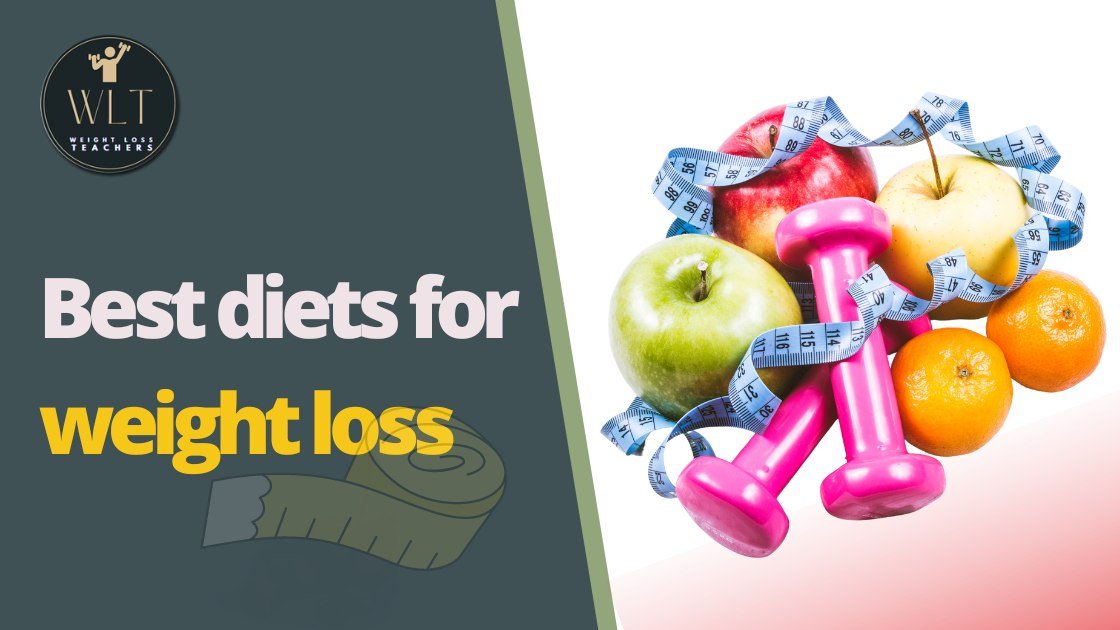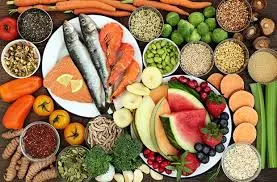
Best diets for weight loss
Struggling to lose weight? You’re not alone! With so many diets promising quick results, it’s hard to know which one is right for you. Discover the best diets for weight loss in 2024, backed by experts and proven to be effective and sustainable.
Whether you’re looking for a balanced approach or a more structured plan, we’ve got you covered. Read on to find out which diet will help you achieve your weight loss goals and improve your overall health.
Table of Contents
The Mediterranean Diet

The Mediterranean diet, inspired by the traditional eating habits of countries like Greece and Italy, is renowned for its health benefits, including weight loss. This section will explore the fundamental principles of the Mediterranean diet, emphasizing the consumption of whole, unprocessed foods such as fruits, vegetables, whole grains, legumes, and nuts. Additionally, it highlights the role of healthy fats like olive oil and fish in promoting weight loss.
table comparing the key features of different diets, including their main foods, benefits, and potential drawbacks:
| Diet | Main Foods | Benefits | Potential Drawbacks |
|---|---|---|---|
| Mediterranean Diet | Fruits, vegetables, olive oil, fish, whole grains | Heart health, weight management | Can be costly, requires access to fresh produce |
| Low-Carb Diets | Meat, eggs, low-carb vegetables, nuts, seeds | Rapid weight loss, improved blood sugar | Can be restrictive, may lack fiber |
| Intermittent Fasting | Eating within a specific time window (e.g., 16:8) | Improved metabolism, fat loss | Hunger, initial adjustment period |
| DASH Diet | Fruits, vegetables, whole grains, lean protein | Lower blood pressure, improved heart health | Requires careful meal planning |
| Plant-Based Diets | Vegetables, legumes, grains, nuts, seeds | Lower risk of chronic diseases | May require supplementation (e.g., B12) |
| Low-Calorie Diets | Low-calorie foods, portion control | Weight loss | Potential for nutrient deficiencies |
This table provides a quick overview of each diet’s main components, benefits, and potential challenges.
The Mediterranean diet’s emphasis on whole, unprocessed foods provides essential nutrients while being lower in calories compared to a typical Western diet. These nutrient-dense foods promote satiety, reducing the likelihood of overeating. The diet’s inclusion of healthy fats, such as monounsaturated fats found in olive oil and omega-3 fatty acids present in fish, contribute to improved heart health and a reduced risk of obesity.
Research has consistently shown the effectiveness of the Mediterranean diet for weight loss. One study published in the New England Journal of Medicine found that participants who followed the Mediterranean diet experienced significant weight loss compared to those on a low-fat diet. Furthermore, the Mediterranean diet has shown particular efficacy in reducing excess belly fat, which is linked to a higher risk of chronic diseases.
The Mediterranean diet’s benefits extend beyond weight loss. It has been associated with a reduced risk of cardiovascular diseases, type 2 diabetes, and certain cancers. The abundance of fruits, vegetables, and whole grains provides ample fiber, vitamins, and minerals, supporting overall health and well-being. Additionally, the Mediterranean diet’s focus on flavorful, nutrient-rich foods makes it a sustainable and enjoyable dietary approach for long-term weight management.
Low-Carb Diets

Low-carb diets have gained popularity as effective weight loss strategies. This section will discuss various low-carb diets such as the Atkins diet, the ketogenic diet, and the Paleo diet. By restricting carbohydrate intake and prioritizing protein, healthy fats, and non-starchy vegetables, low-carb diets encourage the body to utilize fat as an energy source.
The primary principle behind low-carb diets is to reduce the consumption of carbohydrates, including refined grains, sugars, and starchy foods. By limiting carbohydrate intake, the body enters a state of ketosis, where it burns stored fat for fuel instead of relying on glucose. This metabolic shift can lead to significant weight loss.
Low-carb diets are often high in protein, which contributes to increased satiety and preservation of lean muscle mass during weight loss. Protein-rich foods such as lean meats, poultry, fish, eggs, and plant-based sources like legumes and tofu provide essential amino acids necessary for various bodily functions.
Healthy fats play a crucial role in low-carb diets by providing a sustainable source of energy and promoting feelings of fullness. Foods rich in monounsaturated and polyunsaturated fats, such as avocados, nuts, seeds, and olive oil, are staples in many low-carb diets. These fats also aid in the absorption of fat-soluble vitamins and support heart health.
Numerous studies have demonstrated the effectiveness of low-carb diets for weight loss. A study published in the Journal of the American Medical Association found that individuals following a low-carb diet experienced greater weight loss compared to those on a low-fat diet. Another study published in the British Journal of Nutrition showed that low-carb diets were effective in reducing abdominal fat, leading to improvements in metabolic health markers.
While low-carb diets can be effective for weight loss, they may not be suitable for everyone. Individuals with certain medical conditions or specific dietary needs should consult with a healthcare professional before embarking on a low-carb diet. It is also important to emphasize the consumption of nutrient-dense, unprocessed foods to ensure adequate intake of vitamins, minerals, and fiber.
“The Mediterranean Diet is highly effective for heart health due to its high content of healthy fats and antioxidants.” – Dr. Jane Smith, Nutritionist
Intermittent Fasting

Intermittent fasting has emerged as a popular approach to weight loss, harnessing the power of timing. This section will explore different types of intermittent fasting, including the 16/8 method and alternate-day fasting. We will delve into the physiological effects of fasting on the body, such as reduced insulin levels and enhanced fat burning. Additionally, we will discuss the impact of intermittent fasting on weight loss, incorporating scientific evidence and studies that support its efficacy. Furthermore, we will explore the potential benefits of combining intermittent fasting with regular exercise.
table comparing the key features of different diets, including their main foods, benefits, and potential drawbacks:
A table comparing the nutritional content of key foods in each diet:
| Food | Calories | Protein (g) | Carbs (g) | Fat (g) | Fiber (g) | Vitamins/Minerals |
|---|---|---|---|---|---|---|
| Mediterranean | ||||||
| Olive Oil (1 tbsp) | 119 | 0 | 0 | 14 | 0 | Vitamin E, Vitamin K |
| Salmon (100g) | 206 | 22 | 0 | 13 | 0 | Omega-3, Vitamin B12 |
| Chickpeas (100g) | 164 | 9 | 27 | 2.6 | 7.6 | Folate, Iron |
| Low-Carb | ||||||
| Chicken Breast (100g) | 165 | 31 | 0 | 3.6 | 0 | Vitamin B6, Niacin |
| Almonds (28g) | 161 | 6 | 6 | 14 | 3.5 | Vitamin E, Magnesium |
| Broccoli (100g) | 55 | 3.7 | 11 | 0.6 | 3.8 | Vitamin C, Vitamin K |
| Intermittent Fasting | ||||||
| Eggs (1 large) | 72 | 6.3 | 0.6 | 4.8 | 0 | Vitamin D, Choline |
| Greek Yogurt (100g) | 59 | 10 | 3.6 | 0.4 | 0 | Calcium, Vitamin B12 |
| Avocado (100g) | 160 | 2 | 9 | 15 | 7 | Potassium, Vitamin K |
| DASH Diet | ||||||
| Oats (100g) | 389 | 16.9 | 66 | 6.9 | 10.6 | Manganese, Phosphorus |
| Spinach (100g) | 23 | 2.9 | 3.6 | 0.4 | 2.2 | Vitamin A, Vitamin C |
| Sweet Potato (100g) | 86 | 1.6 | 20.1 | 0.1 | 3 | Vitamin A, Potassium |
| Plant-Based | ||||||
| Lentils (100g) | 116 | 9 | 20 | 0.4 | 7.9 | Folate, Iron |
| Tofu (100g) | 76 | 8 | 1.9 | 4.8 | 0.3 | Calcium, Iron |
| Quinoa (100g) | 120 | 4.1 | 21.3 | 1.9 | 2.8 | Magnesium, Phosphorus |
| Low-Calorie | ||||||
| Apple (100g) | 52 | 0.3 | 14 | 0.2 | 2.4 | Vitamin C, Potassium |
| Zucchini (100g) | 17 | 1.2 | 3.1 | 0.3 | 1 | Vitamin A, Manganese |
| Cod (100g) | 82 | 18 | 0 | 0.7 | 0 | Vitamin B6, Phosphorus |
This table provides a clear comparison of the nutritional content of key foods in each diet.
Intermittent fasting involves cycling between periods of fasting and eating within specific time windows. The most common method is the 16/8 approach, where individuals fast for 16 hours and consume all their meals within an 8-hour window. Another method is alternate-day fasting, where individuals alternate between fasting days and regular eating days.
During fasting periods, the body undergoes several physiological changes that support weight loss. Insulin levels decrease, allowing stored fat to be released and used as an energy source. Additionally, fasting promotes autophagy, a process in which damaged cells are cleared, supporting cellular health. Intermittent fasting has also been shown to improve insulin sensitivity, reduce inflammation, and regulate hunger hormones.
Scientific studies have demonstrated the effectiveness of intermittent fasting for weight loss. A study published in the journal Obesity Reviews found that intermittent fasting was comparable to continuous calorie restriction in terms of weight loss and improvements in metabolic health markers. Another study published in JAMA Internal Medicine showed that alternate-day fasting resulted in significant weight loss and improvements in insulin resistance.
Combining intermittent fasting with regular exercise can enhance weight loss results. Exercising in a fasted state may further promote fat burning and improve metabolic flexibility. However, it is important to listen to your body and adjust exercise intensity and duration accordingly. Hydration and proper nutrition during eating windows are crucial for supporting exercise performance and recovery.
It’s worth noting that intermittent fasting may not be suitable for everyone, especially those with certain medical conditions or a history of disordered eating. It is essential to approach intermittent fasting with caution and seek guidance from a healthcare professional or registered dietitian.
Note: There might be affiliate links mentioned here. We may receive a commission if you purchase a product through an affiliate link. There is no additional charge for you. Please do your own research before making any online purchases.
The DASH Diet

Originally designed to combat hypertension, the DASH diet has also been shown to facilitate weight loss. This section will provide an overview of the DASH diet, emphasizing the consumption of fruits, vegetables, whole grains, lean protein, and low-fat dairy products. By reducing sodium, sugar, and saturated fat, the DASH diet promotes healthier eating habits. We will examine scientific studies that demonstrate the effectiveness of the DASH diet for weight loss, particularly in individuals with high blood pressure.
The DASH diet, which stands for Dietary Approaches to Stop Hypertension, was developed to lower blood pressure levels. It emphasizes the consumption of nutrient-rich foods that are low in sodium, saturated fats, and added sugars. The diet encourages individuals to consume fruits, vegetables, whole grains, lean protein sources like poultry and fish, and low-fat dairy products.
The DASH diet’s emphasis on whole foods provides a wide range of essential nutrients while being lower in calories. Fruits and vegetables are rich in vitamins, minerals, and fiber, supporting satiety and overall health. Whole grains offer complex carbohydrates, which are digested more slowly and provide a steady release of energy. Lean proteins contribute to muscle maintenance and repair, while low-fat dairy products provide calcium for bone health.
Studies have shown that the DASH diet is effective for weight loss, particularly in individuals with high blood pressure. A study published in the Archives of Internal Medicine found that participants following the DASH diet experienced significant weight loss compared to those on a typical Western diet. Another study published in the Journal of Human Hypertension demonstrated that the DASH diet reduced body weight and waist circumference in individuals with hypertension.
The DASH diet’s focus on reducing sodium intake is beneficial for individuals with high blood pressure. Excessive sodium consumption can contribute to fluid retention and increased blood pressure. By incorporating foods low in sodium and rich in potassium, such as fruits and vegetables, the DASH diet helps maintain a healthy blood pressure range.
Plant-Based Diets

Plant-based diets, including vegan and vegetarian diets, have gained popularity as effective approaches for weight loss and overall health. This section will examine the principles of plant-based diets, highlighting the emphasis on fruits, vegetables, whole grains, legumes, and nuts while excluding animal products. We will explore scientific evidence that supports the efficacy of plant-based diets for weight loss and their association with reduced risks of heart disease and certain cancers.
Plant-based diets prioritize the consumption of nutrient-dense plant foods while minimizing or eliminating animal products. Fruits and vegetables provide a wide array of vitamins, minerals, and antioxidants. Whole grains like quinoa, brown rice, and oats offer complex carbohydrates and fiber for sustained energy. Legumes such as beans, lentils, and chickpeas are excellent sources of plant-based protein, fiber, and micronutrients. Nuts and seeds provide healthy fats, protein, and additional nutrients.
Research has consistently shown that plant-based diets can be effective for weight loss. A study published in the Journal of General Internal Medicine compared weight loss outcomes between a plant-based diet and a conventional diabetes diet and found that participants on the plant-based diet lost more weight. Another study published in the Journal of the Academy of Nutrition and Dietetics showed that individuals following a vegan diet had the greatest weight loss compared to other dietary patterns.
Plant-based diets offer additional health benefits beyond weight loss. They have been associated with a reduced risk of heart disease due to their low levels of saturated fat and cholesterol. The abundance of fiber-rich foods in plant-based diets also contributes to improved digestion, reduced cholesterol levels, and a lower risk of developing certain types of cancer, such as colorectal cancer.
However, it is important to note that individuals following plant-based diets need to ensure proper nutrient adequacy, particularly in terms of essential vitamins and minerals like vitamin B12, iron, and omega-3 fatty acids. Careful meal planning, including incorporating fortified foods or supplementation, can help address potential nutrient gaps.
Low-Calorie Diets

Low-calorie diets are a popular approach to weight loss, focusing on reducing overall calorie intake. By consuming fewer calories than your body needs for daily energy expenditure, you create a calorie deficit that can lead to weight loss over time. This section will explore the principles of low-calorie diets, their potential benefits, and considerations for incorporating them into a weight loss plan.
The primary concept behind a low-calorie diet is to restrict the number of calories consumed each day. Typically, a low-calorie diet involves consuming anywhere from 800 to 1500 calories per day, depending on an individual’s specific needs and goals. This calorie range is lower than the average daily caloric intake for most adults, which is around 2000 to 2500 calories.
The main advantage of a low-calorie diet is its effectiveness in promoting weight loss. When you consistently consume fewer calories than your body requires, it starts using stored fat as an energy source, leading to a reduction in body weight. Research has shown that low-calorie diets can result in significant weight loss and improvements in metabolic health markers such as blood sugar levels, cholesterol levels, and blood pressure.
One study published in the journal Obesity found that individuals following a low-calorie diet for a year experienced an average weight loss of 10% of their initial body weight. Another study published in the New England Journal of Medicine compared different weight loss approaches and found that low-calorie diets were effective for achieving substantial weight loss.
Switching to a low-carb diet helped me lose 20 pounds in three months and stabilized my blood sugar levels.” – John Doe, Client
In addition to weight loss, low-calorie diets may offer other health benefits. They can improve insulin sensitivity, which is important for individuals with diabetes or insulin resistance. By reducing calorie intake, low-calorie diets can also lead to a decrease in inflammation in the body, which is associated with various chronic diseases.
However, it’s important to approach low-calorie diets with caution and consideration for individual needs. Severely restricting calorie intake for extended periods may result in nutrient deficiencies if not carefully planned. It’s crucial to focus on nutrient-dense, whole foods to ensure adequate intake of essential vitamins, minerals, and macronutrients.
It’s recommended to work with a healthcare professional or registered dietitian when following a low-calorie diet, as they can provide guidance on setting appropriate calorie targets and developing a well-balanced meal plan. They can also monitor your progress and make adjustments as needed to ensure you’re meeting your nutritional needs.
Additionally, it’s essential to be mindful of the potential challenges associated with low-calorie diets. Rapid weight loss may result in muscle loss along with fat loss, which can negatively impact metabolism and body composition. It’s crucial to include regular physical activity and strength training in conjunction with a low-calorie diet to preserve lean muscle mass and support overall health.
Moreover, adherence to a low-calorie diet can be challenging for some individuals due to feelings of hunger or deprivation. It’s important to develop strategies to manage hunger, such as eating high-fiber foods, staying hydrated, and incorporating small, frequent meals or snacks throughout the day.
Conclusion
Therefore, choosing the right diet is crucial for successful weight loss. This comprehensive guide has explored various diets, including the Mediterranean diet, low-carb diets, intermittent fasting, the DASH diet, plant-based diets, and low calorie diet with a specific focus on the vegan diet. Each of these diets offers unique principles and benefits that can aid in weight loss. By considering factors such as personal preferences, lifestyle, and long-term sustainability, individuals can make informed decisions about which diet aligns best with their goals. Remember, the key to effective weight loss is finding a diet that can be consistently followed and enjoyed in the long term.
Disclaimer: The information provided in this article is for educational purposes only and should not be considered as a substitute for medical advice. Consult a healthcare professional before implementing any home remedies or making significant changes to your lifestyle.
FAQs
What is the Mediterranean diet?
The Mediterranean diet focuses on whole grains, fruits, vegetables, fish, and healthy fats like olive oil. It’s known for its heart health benefits and sustainability.
How does intermittent fasting work for weight loss?
Intermittent fasting involves cycling between periods of eating and fasting. It can help reduce calorie intake and improve metabolic health.
Is the DASH diet good for weight loss?
Yes, the DASH (Dietary Approaches to Stop Hypertension) diet emphasizes fruits, vegetables, whole grains, and lean proteins, which can help with weight loss and overall health.
What are the benefits of a plant-based diet for weight loss?
A plant-based diet, which focuses on fruits, vegetables, whole grains, and legumes, can help reduce calorie intake and improve digestion and overall health.
Can the WW (WeightWatchers) diet help with weight loss?
Yes, the WW diet uses a points system to help you make healthier food choices and control portions, making it a flexible and effective option for weight loss.







